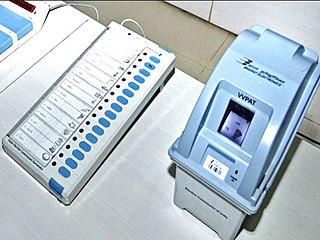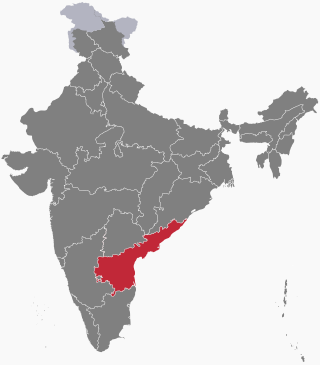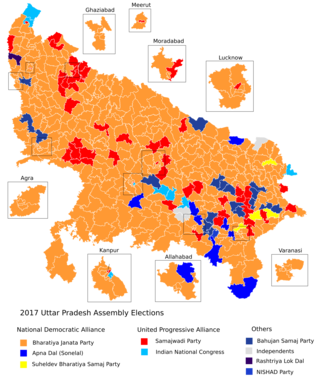Related Research Articles
Electronic voting is voting that uses electronic means to either aid or take care of casting and counting ballots.

Electronic voting is the standard means of conducting elections using Electronic Voting Machines (EVMs) in India. The system was developed for the Election Commission of India by state-owned Electronics Corporation of India and Bharat Electronics. Starting in the late 1990s, they were introduced in Indian elections in a phased manner.
Voter verifiable paper audit trail (VVPAT) or verified paper record (VPR) is a method of providing feedback to voters using a ballotless voting system. A VVPAT is intended as an independent verification system for voting machines designed to allow voters to verify that their vote was cast correctly, to detect possible election fraud or malfunction, and to provide a means to audit the stored electronic results. It contains the name of the candidate and symbol of the party/individual candidate. While it has gained in use in the United States compared with ballotless voting systems without it, it looks unlikely to overtake hand-marked ballots.
India has a parliamentary system as defined by its constitution, with power distributed between the union government and the states. India's democracy is the largest democracy in the world.
Bharat Electronics Limited (BEL) is an Indian Government-owned aerospace and defence electronics company. It primarily manufactures advanced electronic products for ground and aerospace applications. BEL is one of sixteen PSUs under the Ministry of Defence of India. It has been granted Navratna status by the Government of India.
Electronics Corporation of India Limited is a Public Sector Enterprise under the Department of Atomic Energy, established on 11 April 1967 by A. S. Rao at Hyderabad, under the Prime Ministership of Smt Indira Gandhi, to create a strong indigenous base in electronics. ECIL is a multi-product, multi disciplinary organisation with focus on indigenous nuclear energy, space and defence sectors. ECIL also has a strong presence in indigenous electronic security, communications, networking and e-governance domains. ECIL has committed partnerships with nuclear energy establishments of India, particularly Bhabha Atomic Research Center (BARC), Nuclear Power Corporation of India Limited (NPCIL) and Indira Gandhi Centre for Atomic Research (IGCAR). ECIL also actively supports other strategic sectors such as indigenous Defence, Space, Civil Aviation, Information and Broadcasting, Telecommunications, Insurance, Banking, Police and Para-military Forces, Oil and Gas, Power, Space Education, Health, Agriculture, Steel and Coal.
Electronic voting by country varies and may include voting machines in polling places, centralized tallying of paper ballots, and internet voting. Many countries use centralized tallying. Some also use electronic voting machines in polling places. Very few use internet voting. Several countries have tried electronic approaches and stopped because of difficulties or concerns about security and reliability.

Elections in Andhra Pradesh state, India are conducted in accordance with the Constitution of India. The Assembly of Andhra Pradesh creates laws regarding the conduct of local body elections unilaterally while any changes by the state legislature to the conduct of state level elections need to be approved by the Parliament of India. In addition, the state legislature may be dismissed by the Parliament according to Article 356 of the Indian Constitution and President's rule may be imposed.

26°17′N87°17′E

25°32′N87°35′E

Siwan Assembly constituency is an assembly constituency in Siwan district in the Indian state of Bihar. In 2015 Bihar Legislative Assembly election, Siwan will be one of the 36 seats to have VVPAT enabled electronic voting machines.
Saurabh Bharadwaj is an Indian politician from the Aam Aadmi Party, representing Greater Kailash constituency in the Delhi Legislative Assembly. He was the Chairman of the Delhi Jal Board and Minister of Health, Urban development and water since 9 March 2023. He was stripped of his positions on 8 August 2023 and his ministries were given to PWD chief Atishi. He is also the National Chief Spokesperson Of the Aam Aadmi Party.

General elections were held in India in seven phases from 11 April to 19 May 2019 to elect the members of the 17th Lok Sabha. Votes were counted and the result was declared on 23 May. Around 912 million people were eligible to vote, and voter turnout was over 67 per cent – the highest ever, as well as the highest ever participation by women voters.

The Legislative Assembly election was held over five phases in Bihar through October–November 2015 before the end of the tenure of the prior Legislative Assembly of Bihar on 29 November 2015.

The Election Commission of India (ECI) is a constitutional body established by the Constitution of India empowered to conduct free and fair elections in India. The Election commission is headed by a Chief Election Commissioner and consists of two other Election Commissioners.

The election to the 17th Uttar Pradesh Legislative Assembly was held from 11 February to 8 March 2017 in 7 phases. This election saw a voter turnout of 61.11% compared to 59.40% in the previous election.

An election audit is any review conducted after polls close for the purpose of determining whether the votes were counted accurately or whether proper procedures were followed, or both.

The 2019 Andhra Pradesh Legislative Assembly elections were held in the Indian state of Andhra Pradesh on 11 April 2019 for constituting the fifteenth legislative assembly in the state. They were held alongside the 2019 Indian general election.

The 2021 Assam Legislative Assembly election was the 15th quinquennial legislative assembly election held in the Indian state of Assam from March 27 to April 6 in three phases, to elect 126 MLAs to the 15th Assam Legislative Assembly. The votes were counted and the result declared on Sunday, 2 May. The term of the previous Fourteenth Legislative Assembly of Assam ended on 31 May 2021.

Municipal election were held in Delhi on 4 December 2022 to elect 250 councillors of Municipal Corporation of Delhi. The votes were counted and the results were declared on 7 December 2022.
References
- ↑ "Indian wins U.S. award for EVM security work". The Hindu. PTI. 23 October 2010. ISSN 0971-751X . Retrieved 25 February 2019.
- ↑ "Man who questioned EVMs is back, says Election Commission's latest challenge a mistake". The Financial Express. 18 April 2017. Retrieved 25 February 2019.
- ↑ "Security Analysis of India's Electronic Voting Machines" (PDF). 29 April 2010. Retrieved 25 February 2019.
- ↑ Greenberg, Andy (27 August 2010). "Indian Researcher Who Showed E-Voting Security Flaws Jailed, Denied Bail, Charged With Theft". Forbes.com. Retrieved 10 February 2023.